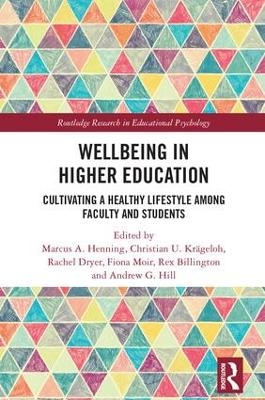
Wellbeing in Higher Education
Routledge (Verlag)
978-1-138-18953-9 (ISBN)
Marcus A. Henning currently works as Associate Professor and Post-Graduate Academic Advisor in the Centre for Medical and Health Sciences Education at the University of Auckland. He is actively engaged in research and his interests include: quality of life, the motivation to teach and learn, organizational behaviour, and professional integrity. Chris U. Krägeloh is an Associate Professor in the School of Public Health and Psychosocial Studies at Auckland University of Technology, and a founding member of the New Zealand World Health Organisation Quality of Life Group (NZ WHOQOL Group). His research interests are in psychometrics, outcome measurement, and mindfulness. Rachel Dryer is a Senior Lecturer in Psychology at Charles Sturt University and a registered psychologist. She has extensive teaching experience in online learning environments. Her clinical and research interests are in psychological conditions that affect learning and behavior, as well as the learning needs of online students with disabilities. Fiona Moir is a Senior Lecturer in The Department of General Practice and Co-Director of Medical Student Affairs in the Medical Programme Directorate at The University of Auckland. She specializes in mental health and practitioner wellbeing, and has developed a wellbeing curriculum and pastoral care structures in the medical programme. D. Rex Billington is an Adjunct Professor in the School of Public Health and Psychosocial Studies at AUT University. Prior to this he served 18 years in the World Health Organization with a career appointment holding senior posts in educational development, in the Global Programme on HIV/AIDS and in mental health. Andrew G. Hill is an Academic General Surgeon practicing in Auckland, New Zealand. While his clinical research interest is in perioperative care his role as a leader of an academic health campus has led to a strong interest both pastorally and academically in health and wellbeing of both students and faculty.
1. Introduction: Developing Meaning and Purpose (Marcus A. Henning, Christian U. Krägeloh, Rachel Dryer, Fiona Moir, Rex Billington, and Andrew G. Hill)
SECTION 1: META-AWARENESS AND WELLBEING
2. Mind-Body Processes (Marcus A. Henning, Mataroria Lyndon, Susan Hawken, and Craig Webster)
3. Spirituality and Religiousness (Nae Chang Han and Christian U. Krägeloh)
4. Emotional Competence (Yuki Nozaki and Masuo Koyasu)
5. Faculty Strategies (Gemma Gulati, Anuradha Mookerjee, and Vijay Rajput)
SECTION 2: FACULTY AND STUDENT STRATEGIES FOR WELLBEING
6. Self-Care: Individual, Relational, and Political Sensibilities (Mirjam Knapik and Ann Laverty)
7. Promoting Resilience and Minimising Burnout (Muhamad Saiful Bahri Yusoff)
8. Mindfulness Practice in Medical Education (Venus Wong, Julie Chen, and Li-Chong Chan)
9. Atoro’ia te peu ‘ā to ‘ui tūpuna: A Culturally Responsive Pedagogy for Pasifika Peoples (Aue Te Ava, Sue Smith, Christine Rubie-Davies and Airini)
10. Sport and Exercise (Matthew Winslade and Bradley Wright)
11. Food and Nutrition (Rajshri Roy, Rebecca McCarroll, Andrea Braakhuis, and Clare Wall)
SECTION 3: CULTIVATING WELLBEING IN HIGHER EDUCATION
12. Personal and Professional Development (Isobel Braidman, Maria Regan, and Julia Humphreys)
13. Teaching and Learning Support Services (Emmanuel Manalo)
14. Equity Issues for Students with Disability (Rachel Dryer)
15. Ergonomics and Ecological Perspectives (Thomas J. Smith)
16. Conclusion: Synthesising wellbeing issues and higher education (Marcus A. Henning, Christian U. Krägeloh, Rachel Dryer, Fiona Moir, Rex Billington, and Andrew G. Hill)
Index
| Erscheinungsdatum | 17.04.2018 |
|---|---|
| Reihe/Serie | Routledge Research in Educational Psychology |
| Zusatzinfo | 10 Tables, black and white; 10 Line drawings, black and white; 2 Halftones, black and white |
| Verlagsort | London |
| Sprache | englisch |
| Maße | 156 x 234 mm |
| Gewicht | 460 g |
| Themenwelt | Geisteswissenschaften ► Psychologie ► Pädagogische Psychologie |
| Sozialwissenschaften ► Pädagogik ► Erwachsenenbildung | |
| ISBN-10 | 1-138-18953-7 / 1138189537 |
| ISBN-13 | 978-1-138-18953-9 / 9781138189539 |
| Zustand | Neuware |
| Informationen gemäß Produktsicherheitsverordnung (GPSR) | |
| Haben Sie eine Frage zum Produkt? |
aus dem Bereich


